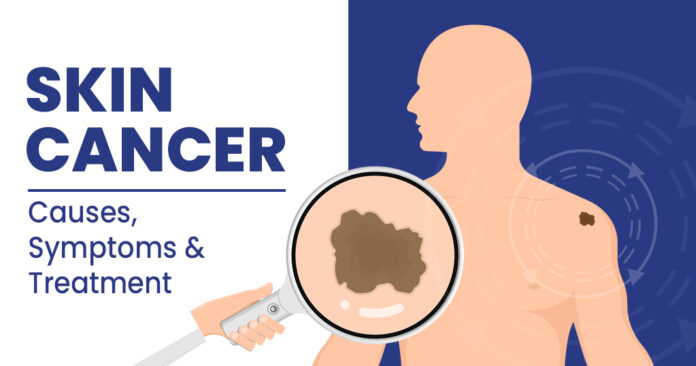Skin cancer is a condition that occurs when abnormal cells grow uncontrollably in the skin. It is the most common form of cancer in the United States, and it is usually caused by prolonged exposure to the sun’s harmful UV radiation. In this article, we will discuss the causes, symptoms, diagnosis, and treatment options for skin cancer.
Causes: The primary cause of skin cancer is exposure to UV radiation from the sun or tanning beds. UV radiation can damage the DNA in skin cells, causing them to grow abnormally and form cancerous tumors. Other factors that can increase the risk of developing skin cancer include having fair skin, a family history of skin cancer, a weakened immune system, and exposure to certain chemicals.
Symptoms: The symptoms of skin cancer can vary depending on the type of cancer. The most common symptoms include:
- A new growth on the skin that doesn’t go away
- A change in the size, shape, or color of an existing mole or lesion
- A sore that doesn’t heal
- A red, scaly patch of skin
- A shiny, waxy bump
If you notice any of these symptoms, it is essential to see a doctor right away.
Diagnosis: To diagnose skin cancer, a doctor will perform a physical exam and may order a biopsy to examine the affected tissue under a microscope. During a biopsy, a small sample of tissue is removed and sent to a lab for analysis. If the biopsy reveals cancerous cells, the doctor will determine the type and stage of cancer to determine the most appropriate treatment plan.
Treatment: The treatment for skin cancer depends on the type, stage, and location of the cancer. The most common treatment options include:
- Surgery: This involves removing the cancerous cells or tumor from the skin. Surgery is often the primary treatment for skin cancer.
- Radiation therapy: This involves using high-energy radiation to kill cancer cells. Radiation therapy may be used alone or in combination with surgery.
- Chemotherapy: This involves using drugs to kill cancer cells. Chemotherapy is typically used for more advanced cases of skin cancer.
- Immunotherapy: This involves using drugs that help the immune system fight cancer. Immunotherapy is a newer form of treatment for skin cancer and is typically used for more advanced cases.
Prevention: Preventing skin cancer involves protecting your skin from the sun’s harmful UV radiation. Here are some tips to help reduce your risk:
- Wear protective clothing, such as long-sleeved shirts and wide-brimmed hats.
- Use sunscreen with an SPF of 30 or higher.
- Avoid tanning beds.
- Seek shade during peak sun hours, typically between 10 a.m. and 4 p.m.
In conclusion, skin cancer is a common form of cancer that can be caused by prolonged exposure to the sun’s harmful UV radiation. Early detection and treatment are critical for a successful outcome, so it is essential to be aware of the symptoms and to see a doctor if you notice any changes in your skin. Taking steps to protect your skin from the sun can also help reduce your risk of developing skin cancer.
































